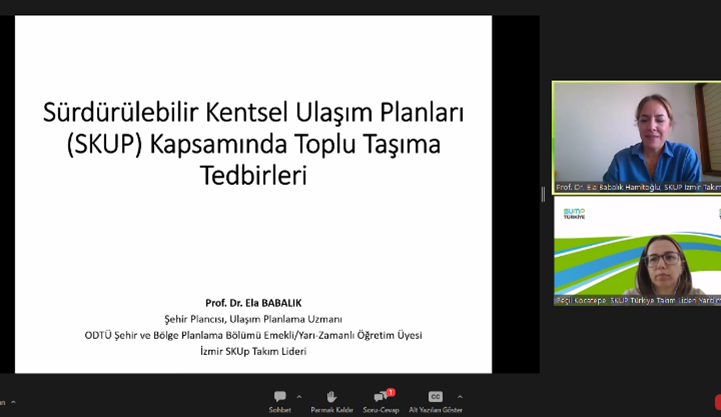
The 24th online training
session of under the Sustainable Urban Mobility Plan (SUMP) Türkiye Project
which is implemented under the Sectoral Operational
Programme for Transport (USOP) as part of the Türkiye-EU financial cooperation
managed by the Ministry of Transport and Infrastructure and for which the Union
of Municipalities of Türkiye is the End Beneficiary, was held on 30 October
2024 with the theme of "Public Transport Planning". Within the scope of
the project, a sustainable urban mobility training programme has been
developed, aimed at enhancing the knowledge, skills, and experience of
municipalities and relevant experts, fostering stakeholder interaction, and
facilitating vision-sharing.The moderator of the training was Seçil Kocatepe, SUMP
Türkiye Deputy Team Leader.
The first presentation of the morning session was delivered by Prof. Dr.
Ela Babalık Hamitoğlu,City Planner, Transport Planning Specialist, and SKUP
İzmir Team Leader. Titled "Public Transport and the City: Main Pillars of Sustainable
Transport in Cities" and "Integration with SUMP and Overall Planning"
Prof. Dr. Hamitoğlu provided an in-depth perspective on sustainability in urban
and transport planning. She emphasised the importance of public transport being
climate-friendly, energy-efficient, and accessible for all and discussed the
impact of the sustainable development paradigm on urban transport within the
context of global developments, current concepts, and approaches. She also
presented examples from Ankara on building resilient public transport systems and
detailed the essentials of a high-quality public transport infrastructure.
The third presentation of the morning session was delivered by Volkan
Recai Çetin (PhD), SUMP Türkiye Team Leader on “Challenges of Attractive Public
Transport Systems (funding, convenient ticketing, multimodality, real time
info, reliability, etc.)” Çetin (PhD) initially explored key factors and
background considerations for creating attractive public transport systems,
highlighting the necessity for a paradigm shift in urban transport from a
sustainability perspective. He addressed issues such as urbanisation and
population growth, increased car ownership, insufficient public transport
systems in both quantity and quality, the lack of integration between spatial
and transport planning, urban sprawl, large/mega projects, and the integration
of transport systems, along with the challenges posed by social habits,
transport culture, and policy deficiencies related to demand management.
The fourth presentation of the morning session was given by Abdulmuttalip
Demirel (PhD), Senior Public Transport Expert at SETS International. In his
presentation on "Public Transport Modes and the Modal Choice Issue,"
Demirel (PhD) highlighted the strategic importance of public transport for
sustainable cities and shared his knowledge and experiences on various public
transport modes, using examples from cities such as Istanbul, Mecca, and
London. He provided insights into mode selection criteria, explained its impact
on urban economy and quality of life with an example from Riyadh, and discussed
the importance of environmental and social factors in mode selection, as well
as future trends in this area.
In the afternoon session, the first presentation was “Strategic
Perspective and New Trends in Public Transport Governance” and it was delivered
by Kaan Yıldızgöz (PhD) from Modaxo EMEA, who offered a strategic perspective
on public transport governance and emerging trends. Drawing on his experiences,
Yıldızgöz (PhD) provided detailed insights into bus, rail, and taxi solutions,
addressing the need for regulations on both pricing and quality. He emphasised
the importance of consistent regulations not only in transport but also in
communication and infrastructure. Yıldızgöz (PhD) also highlighted two primary
regulatory approaches in public transport, underscoring the need for greater
attention to system approach, planning, and governance.
The final presentation of the 24th Webinar was delivered by Veysel
Sarıcı, SUMP Düzce Deputy Team Leader. Sarıcı discussed solutions for
integrating micromobility vehicles with public transportation systems by
examining the interaction between public transport and active and micromobility
modes. He underscored micromobility as a more sustainable alternative to
widespread private vehicle use and suggested that low-speed, eco-friendly, and
cost-effective modes such as e-bikes or scooters should be preferred for short
distances or access to public transport. He discussed the positive impact of
sharing platforms developed through digitalisation on the accessibility and
widespread use of micromobility vehicles, highlighting the urban
environment and health benefits. He stated that the "Mobility-as-a-Service"
(MaaS) approach, considered one of the new innovative approaches in transportation
and promoting sharing over car ownership, encourages the sharing of individual
or corporate micromobility vehicles through digital applications. Sarıcı
emphasized that mobility hubs support the infrastructure that will increase
demand for more sustainable shared and active transportation modes by
complementing the deficiencies or inadequacies in public transportation.
This webinar was concluded by providing participants with a comprehensive
perspective on the integration of sustainable urban transport plans with public
transport, micromobility, and active transport modes.



